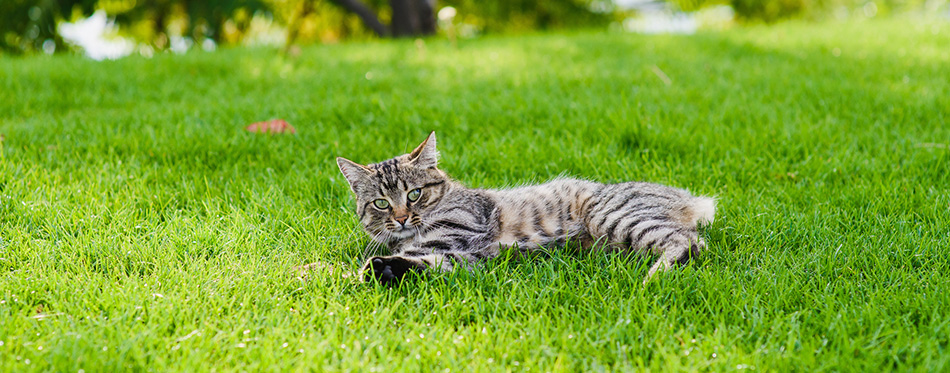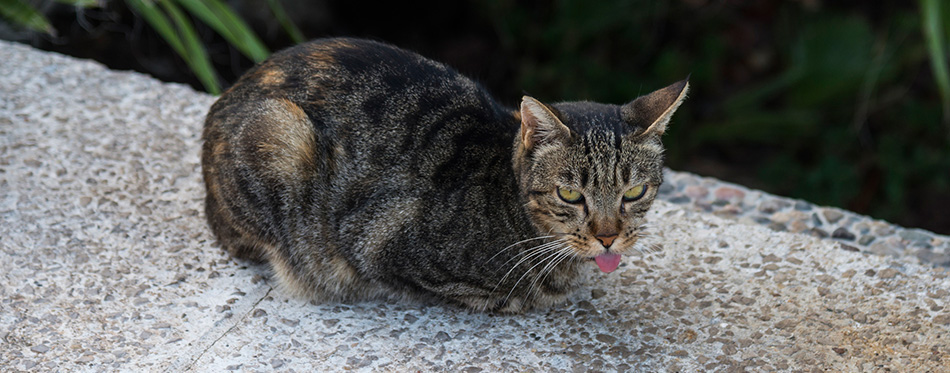Panting in cats is fairly common, but you may want to know why your cat is breathing so fast. You more than likely have many questions about why exactly your cat pants, and about what you can do about your cats panting. You may be even wondering if your cat panting is even normal? Below are some of the reasons that cause your cat to pant, and more information about when you will have to take a panting cat straight to a vet.
If you have seen your cat panting fairly rapidly, you may wonder whether this is normal, especially when there seems to be no obvious reason for it. Panting is a usual way for dogs to be seen to cool themselves down, but cats do not naturally pant in that same way. In truth, panting usually does not happen on a daily basis in cats, but there are some situations where it might be completely ordinary.
Just how long this panting goes on for will let you know whether the panting is due to a more serious problem or not. Where your cat pants only on the odd occasion, such as for a few minutes after they have been busy playing, it is nothing much to worry about. Nevertheless, when a cat is panting, and it will not go away, is a possible cause for concern. When it is something that is fleeting and just goes away by itself, then it is less likely to be a concern as opposed to something that is more persistent. Although cat panting is scary, there are a few possible causes that are typically non-threatening in general. No matter what, if the panting is persistent then most owners will be really worried about their furry friend. Cats ought to be taken to their vet right away if there is any unusual breathing, particularly if it seems like they are sluggish or if anything else is not quite right about their normal behavior.
Cats Pant When Enthusiastic or Hot
Just like dogs, nearly all cats can pant after energetic exercise or when they are trying to cool off as a cat will pant in the heat. Particularly in kittens, you may see panting after they have a runaround, and every now and then they will pant for a very brief period after being outside. When outdoors, cats will sometimes use panting as a cooling device if it is exceptionally warm. When you are suspicious that your cat is panting because they are getting overheated, then you can help to cool them off by supplying clean fresh drinking water and by giving them a cool moist towel to lie down on.
Take a look at our review of the Best Cat Water Fountains.

Cats Pant When Stressed
We all know that cats get stressed and panting can be a sign of this. Lots of cats can be seen panting when they are taken into the vets for an examination. This is especially true if they have been on a journey in a hot car to get there. When they get to a vet they will typically pant temporarily until they reduce their apprehension a little. Since cats cannot perspire, cats will pant if their heartbeat becomes raised in an effort to reduce their own levels of stress. It is normal to see a small amount panting in your cat because some events can be extremely stressful for the majority of cats.
Remember that if your cat is extremely stressed by an event, then that shock can be a life-threatening illness. Any ailment that affects the heart can encourage shock. If not treated instantly, shock in your cat can even be fatal. If your cat has had a big shock or accident, but they still appear to be happy and fine, it is still vital to take them to a vet for a necessary check-up since they could be in shock even without an owner knowing.
Related Post: Cat Calming Spray
Cats Pant When in Pain
It is not uncommon for your cat to pant if they are in pain. This is often the case with female cats when they are giving birth to kittens. Apart from giving birth, which is a natural process, a cat in pain had better be taken to be seen by your vet. As every loving owner knows, cats are gurus at hiding any possible signs of illness so when a cat is panting and you suspect that they are in pain, then it will require direct veterinary care. Cats in pain are often very vocal which is also a sign that they need further treatment.
Health Causes of Panting
Sometimes, when a cat pants, it will be the result of them having a health problem.
There is an overabundance of complaints and illnesses that can be a source of panting in cats. These can consist of:
- Fever
- Heartworms
- Infection
- Low blood oxygen levels
- Respiratory problems
- Fluid on the lungs
- and many more
It is regrettably quite difficult to work out what is happening with your cat all on your own, as most cats will not display any apparent symptoms apart from panting, apathy, or possibly even panic. However, there are ways to work out when you should be calling a vet.
- When your cat’s breathing turns out to be shallow, it will start panting which is very loud or rapid;
- Tiredness, drowsiness, and loss of appetite are all chief alarm bells;
- When your cat pants frequently;
- If your cat keeps hiding but seems to be in some distress;
Any of the above can be signs of a graver issue, which must be addressed directly. There are a number of common conditions that cause a cat to pant.
Asthma
Known as bronchial disease or allergic bronchitis, feline asthma is a non-infectious lung condition that is categorized by the severe tightening of the lower airways in your cat. This results in coughing and often panting. Asthma is one of the most prevalent causes of breathing ailments in cats and frequent panting can be a sign. Asthma attacks will range from mild to more severe in most cats. The inhalation of an allergen by your cat is the cause of asthma which can lead to panting in cats. Common allergens include pollen, smoke, perfume, mold, dust, household sprays and even cat litter.
Heartworm
Even though this is more usually associated with dogs, it is still possible for your cat to can get heartworm. This can cause panting and other breathing difficulties. Treatment is sympathetic care with steroids to reduce any inflammation. As heartworm can be fatal in cats, it is vital to keep your cat on heartworm preventative treatments.
Infections
As you may imagine, infections in the lung in cats will make it difficult for your cat to breathe properly, which can cause them to pant. Infections such as these are typically viral, but it can also be caused by a bacterial infection which then requires antibiotics. Your cat is likely to have a fever and feel sorry for themselves where they have an infection. The use of humidifiers can help to loosen the infection and make breathing easier for your cat in the short term.

Immediate Care for Panting Cats
Unfortunately, there is little that an owner can do at home when their cat starts to experience breathing difficulties. It is important to get them to a vet as soon as imaginable. On the way to your vets, you should try to lessen the amount of stress that your cat is experiencing as much as you possibly can. You should transport your panting cat in a dedicated carrier so that their breathing will not be further compromised by being held in your arms.
Visiting Your Vet
If panting in your cat continues, your vet will start by checking a panting cat’s lungs and heart. It is highly recommended that they go in for an exam if you are concerned. A vet can listen to your cat’s heart and lungs and ensure that there are no murmurs or anything irregular that would be a cause for concern. If an initial exam shows nothing abnormal, then your vet may decide to run a chest X-ray or an ultrasound of the heart. This will certainly help rule out underlying issues and these tests assist your vet in looking for any abnormal heart issues, or fluid in the lungs that might be a root cause of your cats panting. Whenever you are concerned, take a panting cat into your vets for an exam.
Panting in your cat is frequently just a sign of them getting too hot or too excited, from playing too much, or from a small amount of stress. The truth is that most cats do this only sometimes and it is usually not something more serious. If your cats breathing does become more labored, or if the panting happens when your cat is entirely at rest, then have your cat assessed by your vet.

